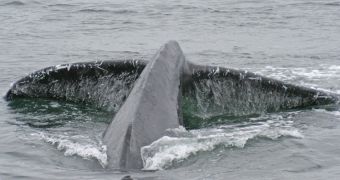Marine biologists have for a long time believed that the humpback whale is one of the cetacean species that is not as socially-active as most of the others are. This idea was based on observations of whale groups, in which individuals did not appear to be interested in communications that much. But a new study comes to shed some doubt on these established conclusions. The research instead proposes that the females of this species are very socially-active, forming friendship bonds with other females that last for several years, LiveScience reports.
“I was very surprised by the prolonged duration. I was expecting stable associations within one season, not beyond. I was particularly surprised by the fact that only females form these bonds, especially females of similar age,” said study researcher Christian Ramp. Details of the new work, called the Mingan Island Cetacean Study, have already been published in the latest issue of the esteemed scientific publication Behavioral Ecology and Sociobiology. The expert refers to the fact that whales known to be “hanging out” the year before reunited at the same spot the next year, and renewed their relationships as if nothing had happened.
During the summer season, humpback whales come together in the Gulf of St. Lawrence, to swim and fish together. It was found in the Study that the same individuals appeared to be returning each year. This investigation was made possible because researchers decided to use photographic evidence to identify the unique patterns on each of the cetaceans. The team also noticed that the whales only formed two possible types of groups – male with female, and female with female. Other combinations were not observed. It was reported that the longest friendships seen lasted for six years, and were identified only between females.
Those whales that kept their friends around the longest were also the most likely to have better reproductive success, the experts say, although why is still unclear. This is the first direct evidence that baleen whales engage in such behavior. This has been clearly established for toothed whales, but never for this variety. The work was carried out by the Mingan Island Cetacean Study group, whose researchers worked in collaboration with colleagues from Germany and Sweden since 1997.

 14 DAY TRIAL //
14 DAY TRIAL //